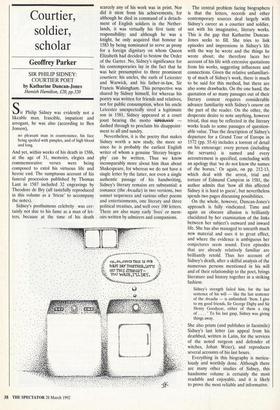Courtier, soldier, scholar
Geoffrey Parker
SIR PHILIP SIDNEY: COURTIER POET by Katharine Duncan-Jones Hamish Hamilton, £20, pp.320 ir Philip Sidney was evidently not a likeable man. Irascible, impatient and arrogant, he was also (according to Ben Jonson), no pleasant man in countenance, his face being spoiled with pimples, and of high blood and long.
And yet, within weeks of his death in 1586, at the age of 31, memoirs, elegies and commemorative verses were being composed to extol his virtuous life and heroic end. The sumptuous account of his funeral procession published by Thomas Lant in 1587 included 32 engravings by Theodore de Bry (all tastefully reproduced in this volume as a 'frieze' to accompany the notes).
Sidney's posthumous celebrity was cer- tainly not due to his fame as a man of let- ters, because at the time of his death
scarcely any of his work was in print. Nor did it stem from his achievements, for although he died in command of a detach- ment of English soldiers in the Nether- lands, it was virtually his first taste of responsibility; and although he was a knight, he only acquired that honour in 1583 by being nominated to serve as proxy for a foreign dignitary on whom Queen Elizabeth had decided to bestow the Order of the Garter. No, Sidney's significance for his contemporaries lay in the fact that he was heir presumptive to three prominent courtiers: his uncles, the earls of Leicester and Warwick, and his father-in-law, Sir Francis Walsingham. This perspective was shared by Sidney himself, for whereas his poetry was written for friends and relatives, not for public consumption, when his uncle Leicester unexpectedly sired a legitimate son in 1581, Sidney appeared at a court joust bearing the motto ASPE41MAIL — dashed through to proclaim his disappoint- ment to all and sundry.
Nevertheless, it is the poetry that makes Sidney worth a new study, the more so since he is probably the earliest English writer of whom a genuine 'literary biogra- phy' can be written. Thus we know incomparably more about him than about Shakespeare, for whereas we do not have a single letter by the latter, nor even a single authentic passage of his handwriting, Sidney's literary remains are substantial: a romance (the Arcadia) in two versions, two sonnet sequences and various other poems and entertainments, one literary and three political treatises, and well over 100 letters. There are also many early 'lives' or mem- oirs written by admirers and companions. The central problem facing biographers is that the letters, records and other contemporary sources deal largely with Sidney's career as a courtier and soldier, not with his imaginative, literary works. This is the gap that Katharine Duncan- Jones seeks to fill. She tries to link episodes and impressions in Sidney's life with the way he wrote and the things he wrote about; she therefore laces her account of his life with extensive quotations from his works, suggesting influences and connections. Given the relative unfamiliari- ty of much of Sidney's work, there is much to be said for this method, but there are also some drawbacks. On the one hand, the quotation of so many passages out of their literary context requires considerable advance familiarity with Sidney's oeuvre on the part of the reader. On the other, the desperate desire to note anything, however trivial, that may be reflected in the literary works leads to some passages of question- able value. Thus the description of Sidney's departure for a Grand Tour of Europe in 1572 (pp. 55-6) includes a torrent of detail on his entourage: every person (including the servants) is named and every accoutrement is specified, concluding with an apology that 'we do not know the names of the horses.' Or again, on pp. 212-13, which deal with the arrest, trial and torture of Edmund Campion in 1581, the author admits that 'how all this affected Sidney it is hard to guess', but nevertheless spends two pages discussing possibilities.
On the whole, however, Duncan-Jones's approach is fully vindicated. Time and again an obscure allusion is brilliantly elucidated by her examination of the links between her subject's outward and inward life. She has also managed to unearth much new material and uses it to great effect, and where the evidence is ambiguous her conjectures seem sound. Even episodes that are already relatively familiar are brilliantly retold. Thus her account of Sidney's death, after a skilful analysis of the numerous persons mentioned in his will and of their relationship to the poet, brings literature and history together in a striking fashion:
Sidney's strength failed him, for the last sentence of his will — like the last sentence of the Arcadia — is unfinished: 'Item. I give
• to my good friends, Sir George Digby and Sir Henry Goodyear, either of them a ring of ... . ' To his last gasp, Sidney was giving • things away.
She also prints (and publishes in facsimile) • Sidney's last letter (an appeal from his • deathbed, written in Latin, for the services • • of the noted surgeon slid defender of • , ' witches, Johan Weier), and reproduces • ' several accounts of his last hours.
• ' Everything in this biography is meticu- '-. lously and worthily done. Although there
• are many other studies of Sidney, this handsome volume is certainly the most readable and enjoyable, and it is likely to prove the most reliable and informative.


























































 Previous page
Previous page